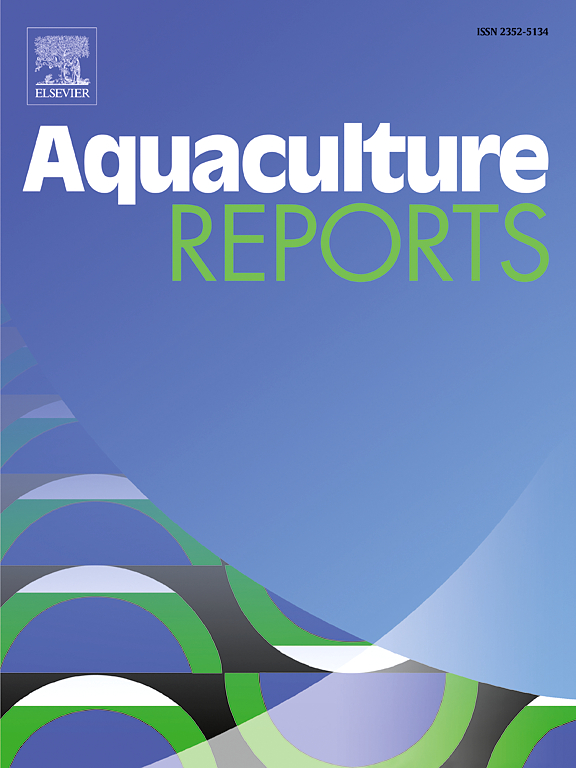Comparative effects of different dietary pectin types on growth performance and intestinal health in pearl gentian grouper (Epinephelus fuscoguttatus♀ × E. lanceolatus♂)
IF 3.2
2区 农林科学
Q1 FISHERIES
引用次数: 0
Abstract
Pectin, a non-starch polysaccharide found in plant materials, has been shown to have positive effects on intestinal health. However, there is limited research on the specific effects of different types of pectin on fish. This study aimed to investigate the effects of different dietary types of pectin on the growth performance and intestinal health of pearl gentian grouper (Epinephelus fuscoguttatus♀ × E. lanceolatus♂). Four experimental diets were formulated, including an 8 % common low-ester pectin (CLP) diet, 8 % amidated low-ester pectin (ALP) diet, 8 % high-ester pectin (HP) diet, and a control diet in which 8 % pectin was replaced by 8 % dextrin. Each diet was randomly assigned to triplicate groups of 35 juvenile groupers (6.66 ± 0.07 g) per tank in a rearing system for 10 weeks. Daily growth coefficient and feed conversion ratio were calculated to assess growth performance, while intestinal mucosal barrier function as well as intestinal physical, chemical, immune, and biological barrier was evaluated to assess intestinal health. The results indicated that dietary inclusion of 8 % pectin generally promoted the growth performance of grouper, but significant difference was observed only in the ALP group. The various type of pectin decreased the intestinal lipase activity and plasma lipopolysaccharide level, increased the intestinal total antioxidant capacity, and down-regulated the expression of intestinal TNF-α and IL-8 but up-regulated the expression of intestinal IL-10. Moreover, dietary 8 % ALP inclusion increased the alkline phosphatase activity, mucoprotein 2 content and the expression level of zonula occludens and Claudin3 in the intestine; while dietary 8 % CLP inclusion increased the intestinal mucoprotein 2 content but decreased intestinal muscularis thickness. Dietary 8 % CLP and ALP inclusion notably increased the relative abundance of Turicibacter and Cetobacterium in the intestine, with Turicibacter contributing to short-chain fatty acid production and Cetobacterium producing vitamin B12, both of which have positive implications for fish health. In conclusion, dietary 8 % ALP inclusion increased the relative abundance of beneficial bacteria in the intestine, enhanced the content of mucoprotein 2, suppressed intestinal inflammation, promoted tight junctions in intestinal cells, reduced intestinal permeability, and facilitated nutrient absorption, thereby supporting the growth of pearl gentian grouper, suggesting the potential of ALP as an additive for enhancing growth and gut health in marine fish.
求助全文
约1分钟内获得全文
求助全文
来源期刊

Aquaculture Reports
Agricultural and Biological Sciences-Animal Science and Zoology
CiteScore
5.90
自引率
8.10%
发文量
469
审稿时长
77 days
期刊介绍:
Aquaculture Reports will publish original research papers and reviews documenting outstanding science with a regional context and focus, answering the need for high quality information on novel species, systems and regions in emerging areas of aquaculture research and development, such as integrated multi-trophic aquaculture, urban aquaculture, ornamental, unfed aquaculture, offshore aquaculture and others. Papers having industry research as priority and encompassing product development research or current industry practice are encouraged.
 求助内容:
求助内容: 应助结果提醒方式:
应助结果提醒方式:


